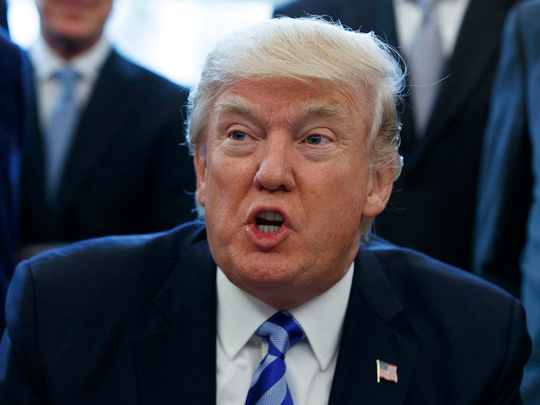
WASHINGTON: President Donald Trump threatened on Thursday to try to knock off members of the House Freedom Caucus in next year’s elections if they don’t fall in line — an extraordinary move that laid bare a civil war within a Republican Party struggling to enact an ambitious agenda.
In a morning tweet, the president warned that the powerful group of hard-line conservatives who blocked the health-care bill last week would “hurt the entire Republican agenda if they don’t get on the team, and fast.”
The president vowed to “fight them” as well as Democrats in the 2018 midterm elections, a threat that his allies said was intended in the short term to make members of the Freedom Caucus think twice about crossing him again. But Trump’s vow was met with defiance by many in the group, including some who accused him of succumbing to the establishment in Washington that he had campaigned against.
Later in the day, Trump singled out three of the group’s members in another tweet, saying if they got on board, “we would have both great health care and massive tax cuts and reform.”
Most of the roughly three dozen Freedom Caucus members were elected from very safe Republican districts, and many of them faced no primary opposition in their last election. To make good on his threat, Trump would have to recruit GOP candidates to make the case that the Republican incumbent they face was unhelpful to an unorthodox president.
Trump’s frustrations with the Freedom Caucus reflect only part of his challenge in moving legislation, even in a Congress where both chambers are controlled by his own party. If Trump does too much to mollify members of the Freedom Caucus, he risks alienating a similar number of moderate Republicans in districts won or narrowly lost by last year’s Democratic presidential nominee, Hillary Clinton.
And on many pieces of Trump’s congressional agenda, he’ll need the support of at least some Democrats, particularly in the Senate, an uncertain prospect given the toxic partisan environment on the Hill.
House Speaker Paul Ryan told reporters a few hours after Trump’s first tweet on Thursday that he sympathised with Trump.
“I understand the president’s frustration,” said Ryan, who has been unable to push the health-care bill through his own chamber. “About 90 per cent of our conference is for this bill to repeal and replace Obamacare and about 10 per cent are not. And that’s not enough to pass a bill.”
Ryan said he had no immediate plans to bring the health-care bill back to the House floor, saying it was “too big of an issue to not get right.”
Trump and his White House advisers have been frustrated by the intransigence of Freedom Caucus members, led by Rep. Mark Meadows.
In a series of White House meetings, Trump lobbied them intensively to support the GOP plan to replace President Barack Obama’s signature domestic achievement, only to see the bill collapse last Friday after Meadows and some of his allies said they would not vote for it. The bill also faced strong opposition from more moderate Republicans who were concerned that it went too far in cutting Medicaid and leaving millions of people without insurance.
“This has been brewing for a while,” a White House official said of Trump’s decision to target Freedom Caucus members and other GOP foes.
“Our view is: There’s nothing as clarifying as the smell of Air Force One jet fuel. So if he needs to bring in the plane and do a rally, he’s going to think about doing that,” said the official, who spoke on the condition of anonymity because the official was not authorised to speak publicly.
The official added that Trump and White House aides are “sick and tired” of seeing Freedom Caucus members on television in recent days.
Trump’s threat comes as Republican leaders are bracing for a month of potential GOP infighting over spending priorities. Congress must pass a spending bill by April 28 to avert a government shutdown, but the path ahead is narrow and filled with obstacles.
Beyond that, the same divide that derailed the health-care legislation could imperil the next marquee legislation that Trump wants to tackle: tax reform.
White House press secretary Sean Spicer told reporters Thursday that Trump remains committed to “a bold and robust agenda,” adding: “He’s going to get the votes from wherever he can.”
Since Friday’s debacle, Trump and his aides have increasingly talked up the possibility of working with Democrats on a reboot of the health-care bill and other priorities — but that prospect has also divided Republicans on Capitol Hill.
In a television interview that aired on Thursday morning, Ryan said he does not want to see Trump have to work with Democrats on revamping the Affordable Care Act — a seven-year pledge by Republicans — only to draw flak from some members of his own party, including Senator Bob Corker.
“He’s irritated,” anti-tax advocate Grover Norquist said in explaining Trump’s decision to lash out at Freedom Caucus members. “During the health care discussions, the Freedom Caucus would say they’d support him if they got one thing, then they’d want another thing. If you’re Trump, you wonder, ‘Why are these people meeting with me if they’re always going to be a ‘no’ vote?’ There was room for give, and they wouldn’t give.”
If Trump gets involved in Republican primaries, Norquist said he thinks it’s possible Trump could “get some scalps.”












